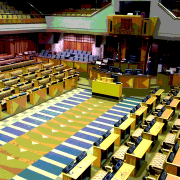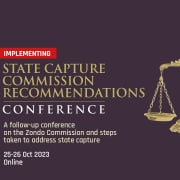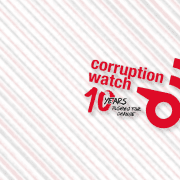|
Getting your Trinity Audio player ready...
|
“You are the only person I know who has read the Zondo commission report from cover to cover.”
This is how Rabbi Gideon Pogrund, director of the Centre for Business Ethics at the Gordon Institute for Business Science, introduced scholar-in-residence Prof Philip Nichols, from the Wharton School of Business at the University of Pennsylvania, at the beginning of a recent video conversation filmed some weeks ago between the two.
They were speaking on the topic of South Africa’s struggle against corruption, and Nichols, a world-renowned academic who has written many papers on various aspects of corruption and business ethics, had some rather complimentary things to say about the country’s anti-corruption efforts.
Showing that an outsider’s view can be both refreshing and surprising, he said: “South Africa is doing a lot of good things with respect to getting a handle on and eventually controlling and getting rid of, to the extent possible, corruption.”
On the ever-relevant topic of the mood in the country, he said: “It is both understandable and probably a good thing that people are angry about the burden that’s been placed on them here in South Africa. It is absolutely natural and understandable that people are frustrated, and again, that’s a good thing.”
While the existence of the current situation is by no means good, Nichols clarified, the fact that people are reacting in a way that shows they don’t want this kind of system to exist, is important.
Extraordinary achievement
Moving to the work of the Zondo commission, Nichols described its report as an “extraordinary human achievement”.
He offered some interesting insights, saying state capture as South Africa experiences it is relatively unique. “It is unusual to see a systemic, planned takeover of a government by a criminal organisation. They [the Gupta family] would characterise themselves as a business family, but what they were doing was a crime, and they were organised,” Nichols clarified.
The Zondo report was detailed and carefully documented, he said, providing a thoughtful understanding and dissection of what happened during the state capture years. “It means that South Africa and the people of South Africa have taken a really important step towards understanding the manifestation of corruption in this polity.”
This is important because there can be no effective response to corruption, particularly systemic corruption, unless there is an understanding of how it manifests in a particular place. “In every place it manifests itself differently, and every response is going to be different. South Africa has taken that extraordinarily difficult step that a lot of places just don’t take the time or make the investment in doing.”
Another plus is that South Africa has droves of committed, smart, and dedicated people who understand there needs to be a response, and are talking together and working together, Nichols added. “That’s also a hopeful sign.”
He wrapped up the first part of the conversation by stating: “From where I’m sitting, says someone who doesn’t have to experience the daily power shortages, the train delays, I can say South Africa is doing some really, really good things. Doesn’t mean that an outcome will be perfect at the end, but the steps that South Africa is taking, that the people of South Africa are taking shows that there are good things going on here.
“There are challenges, and we could wish that the government were more on board – but to say that nothing’s being done would be a lie. To say that the Zondo commission happened and then nothing happened after that belies the importance of the Zondo report, and also is probably not accurate as well. These things take time.”
Business and civil society
Pogrund turned to the topic of the work of civil society, asking Nichols how business and civil society – having first established that the general view is that government lacks the will or capacity to fight corruption – can work together more effectively to create an impact, given government’s limitations.
“Civil society has a long history of fighting against corruption,” Pogrund said. “Civil society, as we know, played a critical role during the Zuma administration. Business more recently, particularly through the crime and corruption work stream, has played a strong role.”
It’s important to understand that in life, government is not the beginning and end, Nichols said. “Our lives are mostly managed and conducted within the context of civil society, and in a place like South Africa, which is true of much of the world, our existence with respect to production, distribution, and consumption of services and material goods is largely done through business, which is a subset of society.”
The two entities – civil society and business – play a crucial role in everyday life, therefore, and there is a natural partnership with room to take advantage of it, he added.
“Business has resources, and experience in harnessing those resources. They’ve got experience in understanding discrete tasks and in how to unravel that task and create a plan. And business people use phrases like KPIs or getting that task done, they’re good at that. Civil society has a deep understanding of the society as a whole, not just the marketplace, a deep understanding of the frustrations and the anger, a deep understanding of relationships, all of which are really important in crafting a response to widespread systemic corruption as experienced in South Africa.”
Corruption does not require merely a corruptor and a corruptee, he said, but more than that, it needs a context. “That context is society. Bringing together business with its resources, its experience, its understanding of how to get things done, and society, which is the context, that’s a magical combination that could go a long way toward getting around the problem created by a government that isn’t demonstrating the kind of commitment that we might want with respect to this problem.”








